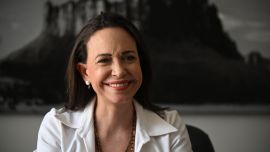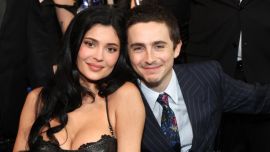Shock and awe. On Thursday, in a ruling that sent shockwaves through Argentine politics, controversial Federal Judge Claudio Bonadio issued a series of court rulings that called for former president and newly elected senator for Buenos Aires province, Cristina Fernández de Kirchner, to be stripped of her congressional immunity and detained.
Judge Bonadio accused Fernández de Kirchner, former Foreign Minister Hector Timerman, ex-vice presidential nominee Carlos Zannini, Kirchnerite picket leader Luis D’Elía and others of colluding to cover up Iran’s alleged involvement in Argentina’s worst terrorist attack at the AMIA Jewish community centre through the controversial Memorandum of Understanding (MoU), a pact with Iran agreed in 2012 during the time Fernández de Kirchner’s administration ruled the nation.
The attack, in 1994, claimed the lives of 85 people and left some 300 injured. Bonadio ruled that the former president should face arrest for high treason as part of the investigation into late AMIA special prosecutor Alberto Nisman’s fateful accusation. Fernández de Kirchner was quick to respond, pulling together a press conference where she branded the charges “made up” and politically motivated.
“Mauricio Macri is the director of the orchestra and Bonadio plays the judicial music,” Fernández de Kirchner told reporters in an impromptu cadena nacional, “this is an excess that violates the rule of law. [The national government] is trying to cause personal and political damage to its opponents. This isn’t democracy.”
Responding to reporters’ questions — which she almost never did during her two terms as president — the senator-elect speculated about the timing of Bonadio’s ruling. “Asking the Senate to allow my detention for treason, 72 hours before taking my seat is an attempt to discipline me,” she said, noting that for the past two years she was not protected by congressional immunity, yet that Bonadio hadn’t moved forward with preventative imprisonment.
“Harassment and humiliation violates the rule of law and democracy, and degrades our justice system. This shows how Macri is the man truly responsible for the legal and political manoeuvres behind the persecution of the opposition.” She pointed to the large presence of cameras and journalists that witnessed the 2.30am arrest of Carlos Zannini in Rio Gallegos as proof that the government is using the case against her to mount a media circus. “Look how on social media the labour reform bill and the looting of pensioners’ incomes, the increases to services and prices, they were all gaining attention. Now they’ve been buried by this.”
NISMAN'S HYPOTHESIS
Basing his ruling on Nisman’s hypothesis, Bonadio’s use of “high treason” is without precedent, as it hasn’t been used against any president or former president in history. Indeed, the federal judge claims Fernández de Kirchner aided an “enemy” of the state: Iran. According to the ruling, Iranian nationals are accused of having perpetrated the 1994 AMIA terrorist attack that left at least 85 dead and hundreds injured. They were the expected beneficiaries of the signing of the MoU, which according to its seventh clause would cause Interpol’s “red notices” or international arrest warrants to fall.
Bonadio mentions Ronald Noble, former secretary general of Interpol, who is said to have a close relationship with Timerman. “We doubt of the impartiality that Noble should have as Secretary-General of Interpol who, because of his relationship with Timerman, aided the defendents to put together a screen before the Argentine society.”
Official reaction At Government House, the Macri administration was quick to distance itself from Bonadio’s decision. Claiming to have been surprised by the ruling, sources close to President Macri and Cabinet Chief Marcos Peña were quick to their feet: “We had heard the rumour, but we found out about [the ruling] this morning,” one source told Perfil on Thursday, “we expected Cristina to be charged, not a request for her arrest.”
In a Facebook post, Peña said: “This is strictly a judicial matter […] Argentines know President Mauricio Macri didn’t come to manipulate the Judiciary, but to help our country to grow and strengthen our institutions.” Since the Macri administration took office, several highflying Kirchnerites have been placed behind bars. From Patagonian businessman – and good friend of Néstor Kirchner – Lázaro Báez, to Fernández de Kirchner’s vice-president Amado Boudou. In every case, the Judiciary moved forward on corruption charges, making Bonadio’s ruling extraordinary. In late October and early November, the Judiciary sent out signs that things had changed. Néstor and Cristina’s Public Works Minister, Julio De Vido, once deemed untouchable, lost his congressional immunity after the Chamber of Deputies voted to strip him of it — at the request of Bonadio and Federal Judge Luis Rodríguez — and subsequently turned himself in to authorities. He was charged with graft and imprisoned through the legal concept of a “preventative detention.”
One week later, leaked video showed a handcuffed and sleepy Boudou in sweatpants and without shoes, as he was being read his rights. Judge Ariel Lijo charged him with illicit enrichment and racketeering, and also based his arrest on “preventative detention.” The chances that Cristina Fernández de Kirchner will end up in a federal prison anytime soon appear slim. Miguel Angel Pichetto, a former ally of the ex-president and current head of the Peronist block, has already publicly rejected Judge Bonadio’s request. Pichetto, with 25 senators responding to him, can essentially block any vote in the Senate, particularly one that requires two-thirds or 44 of the 72 senators, as he would count with the support of the Kirchnerites and other leftist factions.
The ruling Cambiemos (Let’s Change) coalition has all but confirmed it won’t push to lift Fernández de Kirchner ’s immunity, leaving it out of a presidential decree extending Congressional sessions until the end of the year, which in turn includes the 2018 Budget, tax reform, fiscal compact and the controversial labour reform. But the furore, as is natural in Argentine politics, looks sure to continue on for now.























Comments